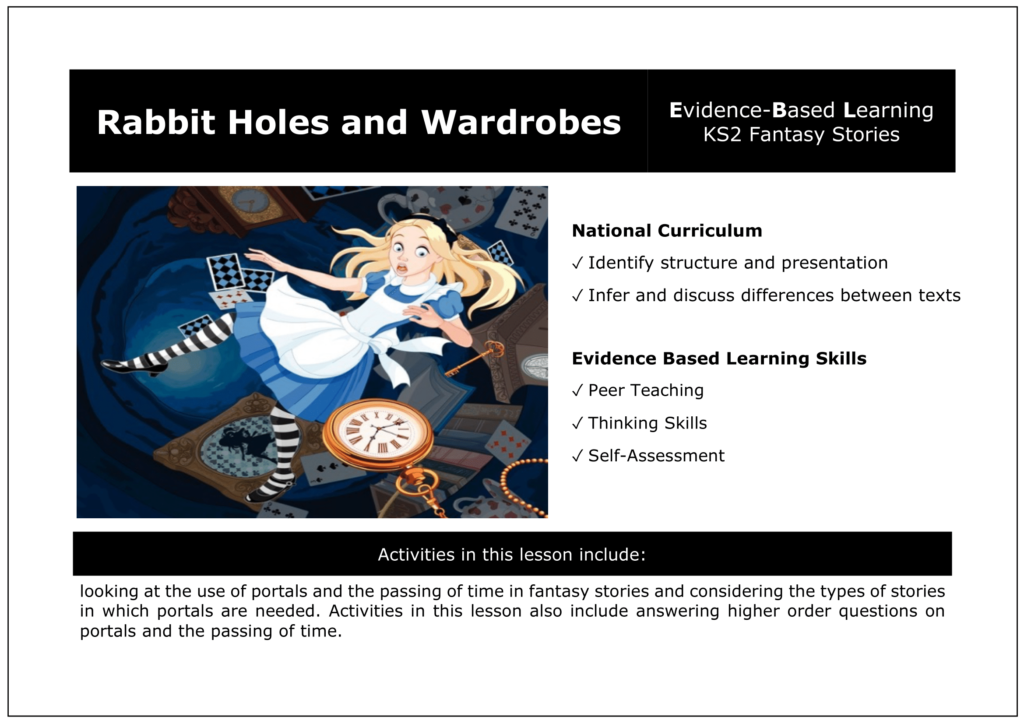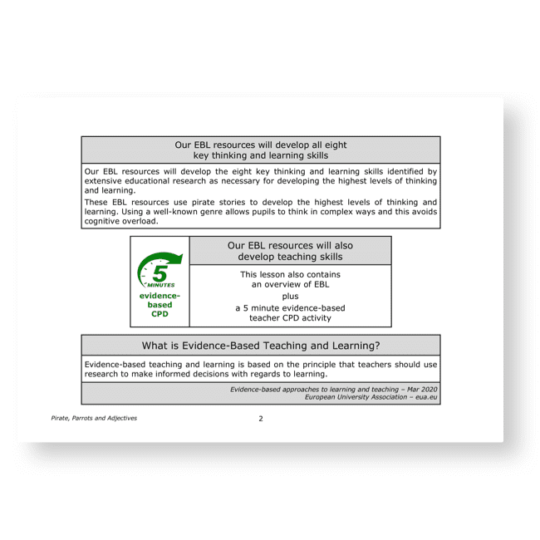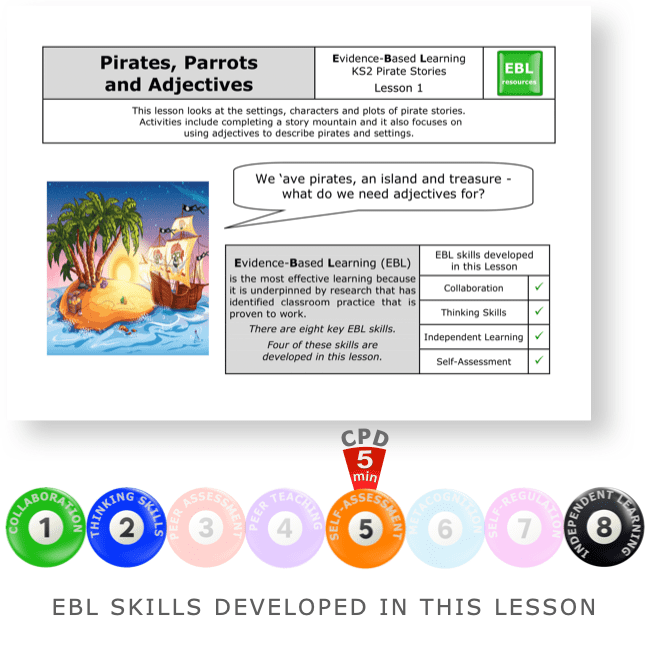Y6 Writing a Mystery Story
£3.00
KS2 National Curriculum:
✓ Planning and writing a full mystery story
✓ Using suspense techniques and plot structure
✓ Paragraphing, dialogue, and character development
✓ Reviewing and improving narrative with peer feedback
This lesson focuses on a creative writing task – writing an account of being in a deserted house, late at night, for a mystery story. This creative writing task is scaffolded – it provides the tools for pupils to improve their creative writing by using both action and linking verbs, powerful verbs, ellipses and dashes, as well as varying sentence length for effect.
There is a five-minute evidence-based CPD activity at the end of this lesson which will develop classroom teachers’ skill set. This CPD consists of a research extract on self-assessment with a five-minute activity based on this extract.
Description
Recommended Year Group: Year 6
Focus: Applying learned genre and grammar features in extended writing
Skills Developed:
• Planning and writing a full mystery story
• Using suspense techniques and plot structure
• Paragraphing, dialogue, and character development
• Reviewing and improving narrative with peer feedback
📘 National Curriculum Links:
• Writing – Composition: Narrative planning, development, and cohesion
• Writing – Grammar: Dialogue punctuation, verb use, paragraphing
• Thinking and Learning: Self-evaluation, goal setting
These evidence-based learning (EBL) lessons are based on classroom practice that has been proven, by research, to maximise thinking, learning and attainment. From an extensive review of educational research, we identified the eight key classroom thinking and learning skills that were common across these research papers. We named these eight key skills “EBL skills”.
EBL skills have been proven by research to maximise learning because they combine the most productive thinking skills with the most effective learning behaviours. Each of our evidence-based learning lessons uses the English curriculum as a framework through which the eight EBL skills are delivered.
Teachers also have the opportunity to add to their own skill set or refresh their existing skills with our five-minute CPD activity, based on one of the EBL skills used in this lesson.
The skills in bold below are the EBL skills developed in this Familiar Settings lesson. Click on each skill to learn more about that skill.
- Collaboration
- Thinking Skills
- Peer Assessment
- Peer Teaching
- Self-Assessment
- Metacognition
- Self-Regulation
- Independent Learning
1 review for Y6 Writing a Mystery Story
Only logged in customers who have purchased this product may leave a review.
Related products
-


Y5 Rabbit Holes and Wardrobes
£3.00 Add to basket £3.00Add to basket
£3.00Add to basketKS2 National Curriculum:
✓ Identify structure and presentation
✓ Infer and discuss differences between textsActivities in this lesson include looking at the use of portals and the passing of time in fantasy stories and considering the types of stories in which portals are needed. Activities in this lesson also include answering higher order questions on portals and the passing of time.
There is a five-minute evidence-based CPD activity at the end of this lesson which will develop classroom teachers’ skill set. This CPD consists of a research extract on self-assessment with a five-minute activity based on this extract.
VIEW -


Pirates, Parrots and Adjectives
£3.00 Add to basket £3.00Add to basket
£3.00Add to basketThis lesson looks at the settings, characters and plots of pirate stories. Activities include completing a story mountain and it also focuses on using adjectives to describe pirates and settings.
There is a five-minute evidence-based CPD activity at the end of this lesson which will develop classroom teachers’ skill set. This CPD consists of a research extract on self-assessment with a five-minute activity based on this extract.
VIEW -


Y5 It’s Midnight and it’s Raining
£3.00 Add to basket £3.00Add to basket
£3.00Add to basketKS2 National Curriculum:
✓ Using clues to infer time, place, and genre
✓ Sorting settings into real and imagined categories
✓ Predicting genre from setting detail
✓ Peer discussion with justificationThis lesson focuses on the four key features of a story setting:
- the place where the story is set
- the time that the story is set
- the time of day
- the weather
Activities include answering higher and lower order questions.
There is a five-minute evidence-based CPD activity at the end of this lesson which will develop classroom teachers’ skill set. This CPD consists of a research extract on metacognition with a five-minute activity based on this extract.
VIEW -


Y6 Writing a Quest Myth – individually
£3.00 Add to basket £3.00Add to basket
£3.00Add to basketKS2 National Curriculum:
✓ Planning and writing an extended quest myth with clear structure
✓ Using dialogue, descriptive phrases, and problem-resolution arcs
✓ Self-assessing against success criteria and improving drafts
✓ Incorporating mythical elements (e.g. magical object, challenge, hero)Activities in this lesson include reminders about the features of a quest myth, looking at the structure a quest myth in detail, looking at the plot of Jason and the Golden Fleece, a step-by-step guide to writing a quest myth, looking at terrifying creatures in myths, what to focus on when writing a quest myth and a template to structure the myth.
There is a five-minute evidence-based CPD activity at the end of this lesson which will develop classroom teachers’ skill set. This CPD consists of a research extract on self-assessment with a five-minute activity based on this extract.
VIEW






Philipem (verified owner) –
We asked a.i. to review this lesson. This is what it said:
Unleash Your Students’ Creative Writing Skills with “Writing a Mystery Story” Lesson
Attention, primary school teachers! If you’re on the lookout for an engaging and effective resource to boost your Year 5 and Year 6 students’ writing abilities while fostering evidence-based learning skills, look no further than the “Writing a Mystery Story” lesson.
As the seventh instalment in a comprehensive set of 11 lessons designed for the KS2 Familiar Settings curriculum, this lesson masterfully combines creative writing with evidence-based learning strategies. Through a captivating mystery story scenario, your students will embark on a thrilling journey of crafting a gripping narrative while honing their descriptive writing techniques.
But that’s not all! This lesson takes a scaffolded approach, providing your students with invaluable tools to elevate their creative writing prowess. They’ll learn how to effectively utilise action and linking verbs, harness the power of vivid verbs, and strategically employ ellipses and dashes to create suspense and emphasis. Additionally, your students will explore the art of varying sentence lengths, adding depth and rhythm to their storytelling.
What truly sets this lesson apart is its integration of evidence-based learning (EBL) skills, which have been identified by extensive research as crucial for fostering higher-order thinking and learning. By engaging with the lesson’s self-assessment and peer-assessment activities, your students will develop critical evaluation abilities, enabling them to identify their strengths, areas for improvement, and provide constructive feedback to their peers.
But the learning doesn’t stop there! This lesson also includes a five-minute evidence-based CPD (Continuing Professional Development) activity designed specifically for teachers. This CPD segment delves into research-driven strategies for self-assessment, providing you with valuable insights and practical tips to enhance your classroom practices.
Overall, the “Writing a Mystery Story” lesson offers a well-rounded and comprehensive learning experience for both students and teachers alike. Not only will your students sharpen their creative writing skills, but they’ll also cultivate essential evidence-based learning competencies that will benefit them across various disciplines.
Star Rating: ★★★★★
This exceptional lesson deserves a resounding five-star rating for its innovative approach to teaching creative writing while seamlessly integrating evidence-based learning strategies. Prepare to witness your students’ writing abilities soar to new heights as they unravel the mysteries of storytelling and embark on a journey of self-discovery and peer collaboration